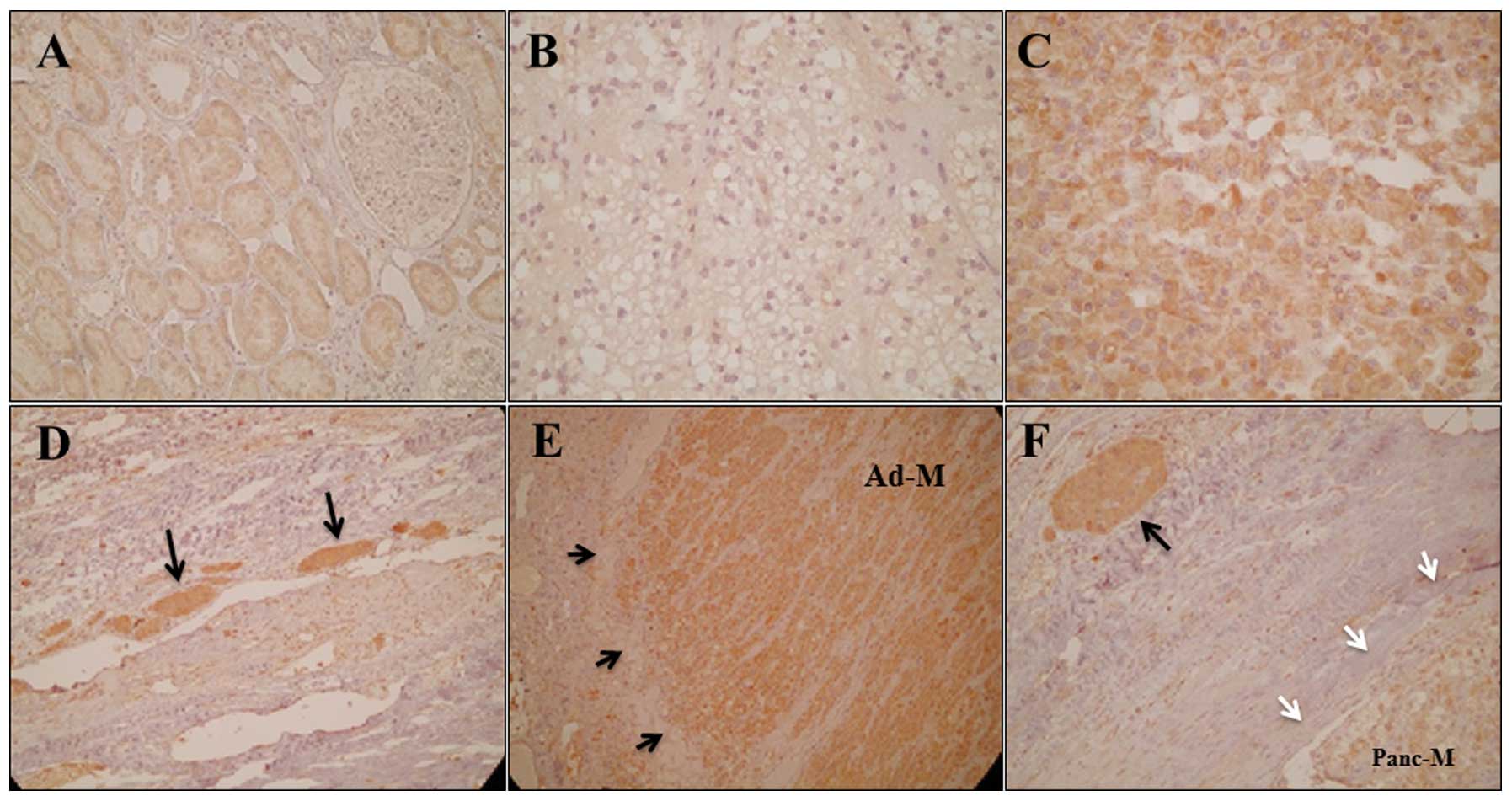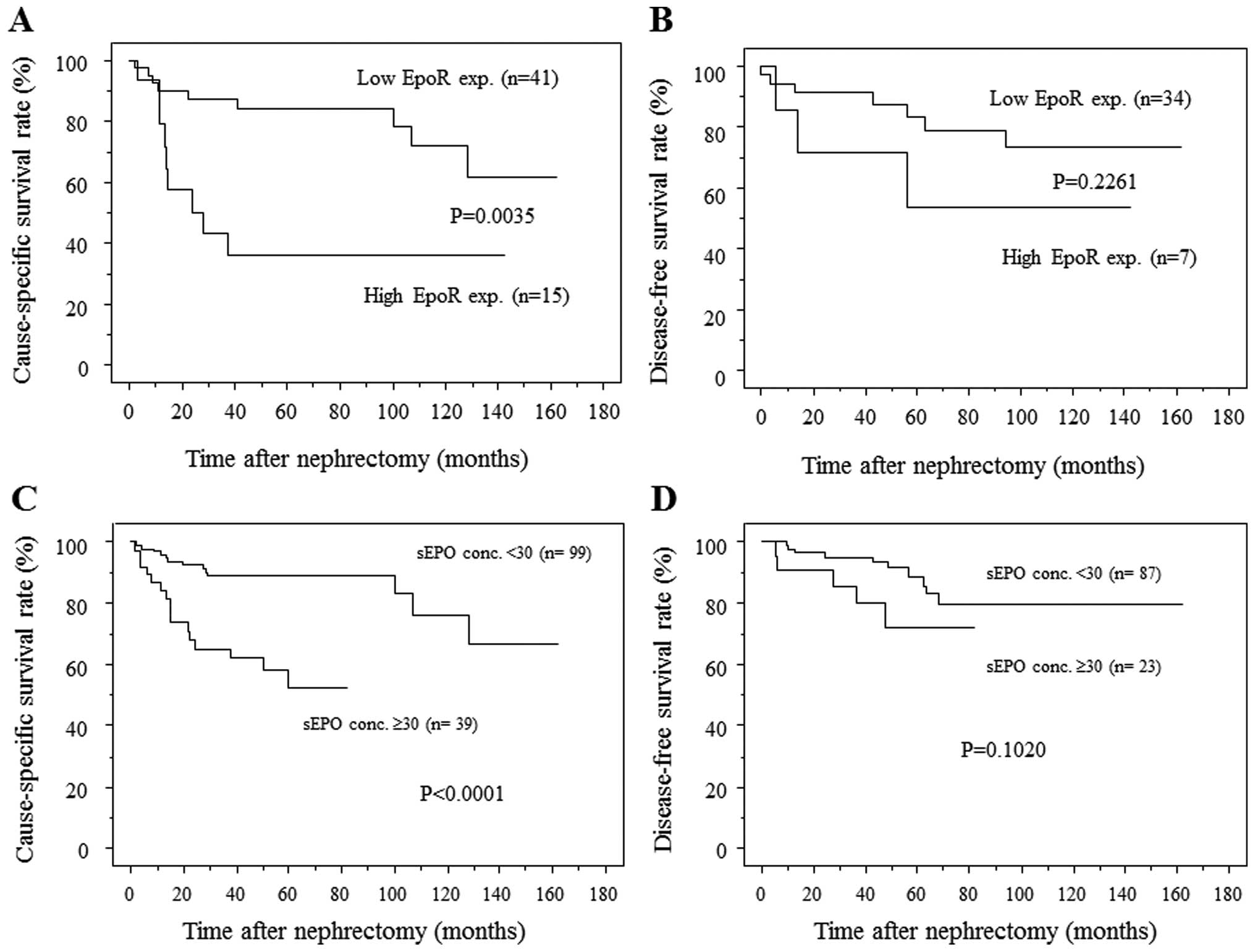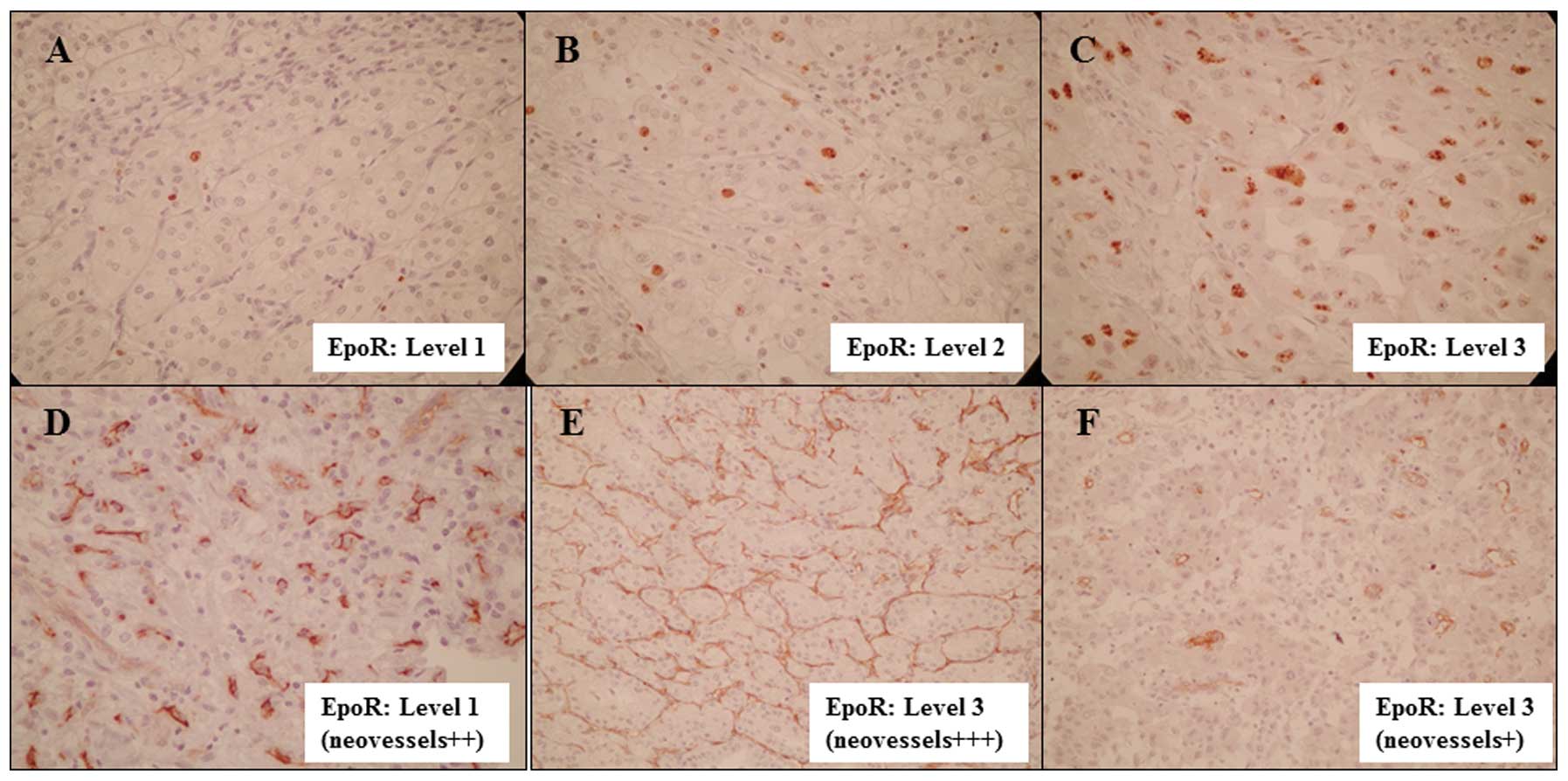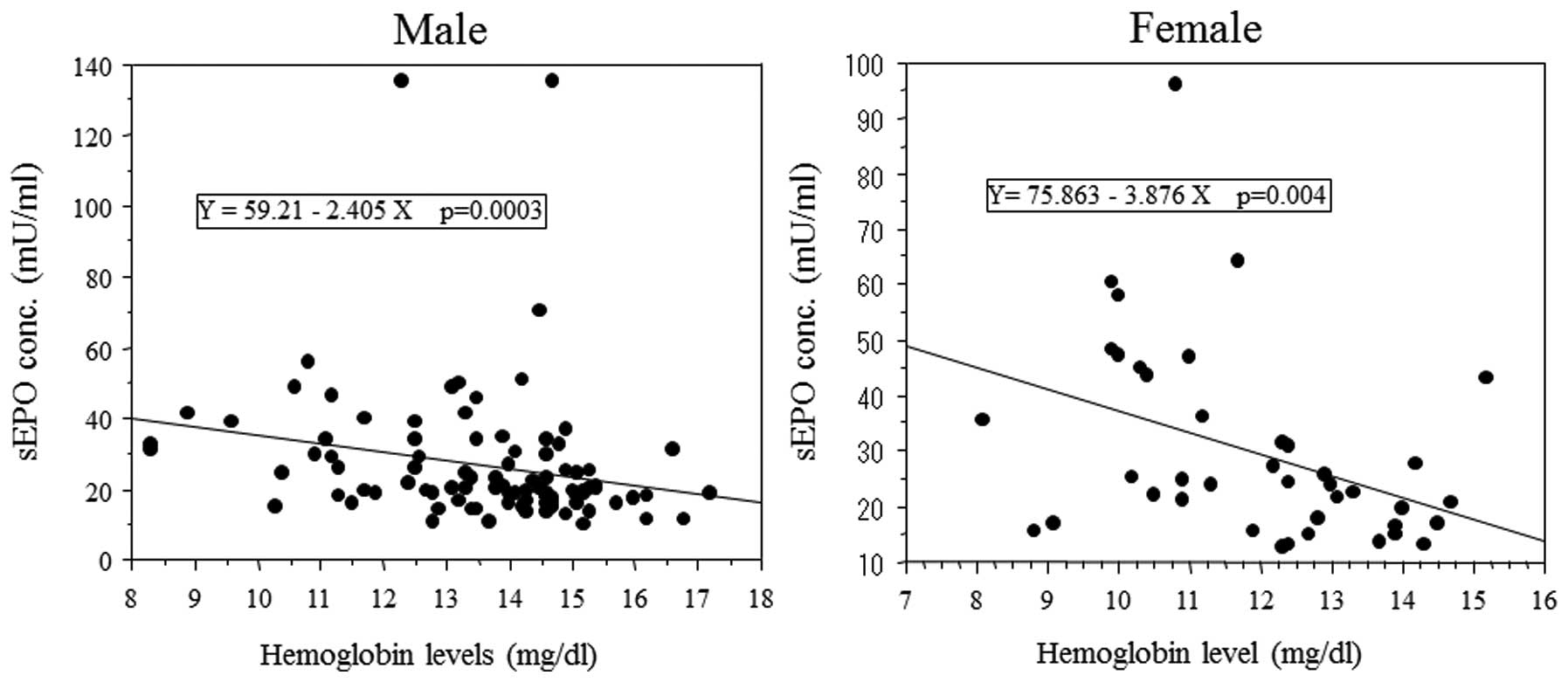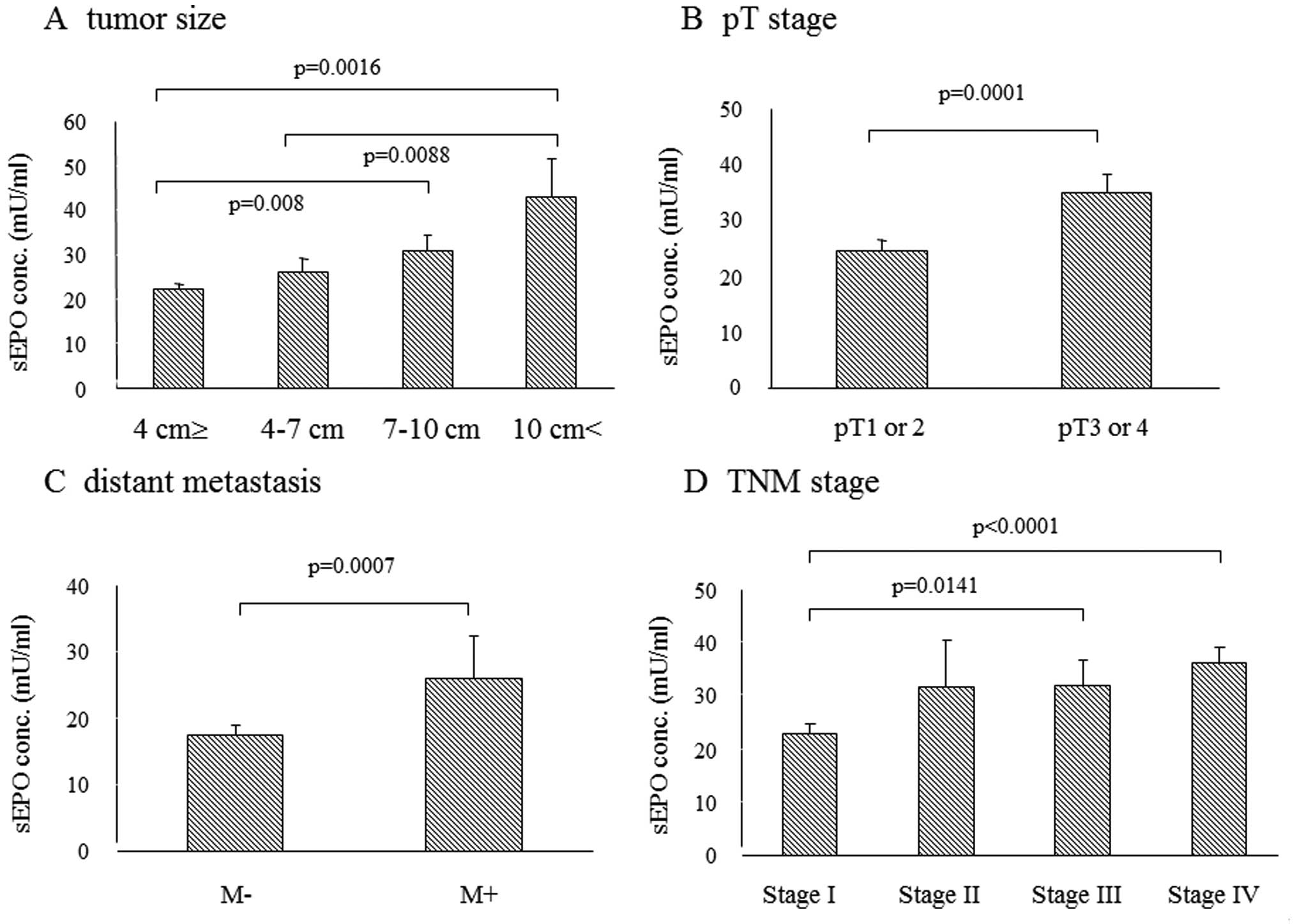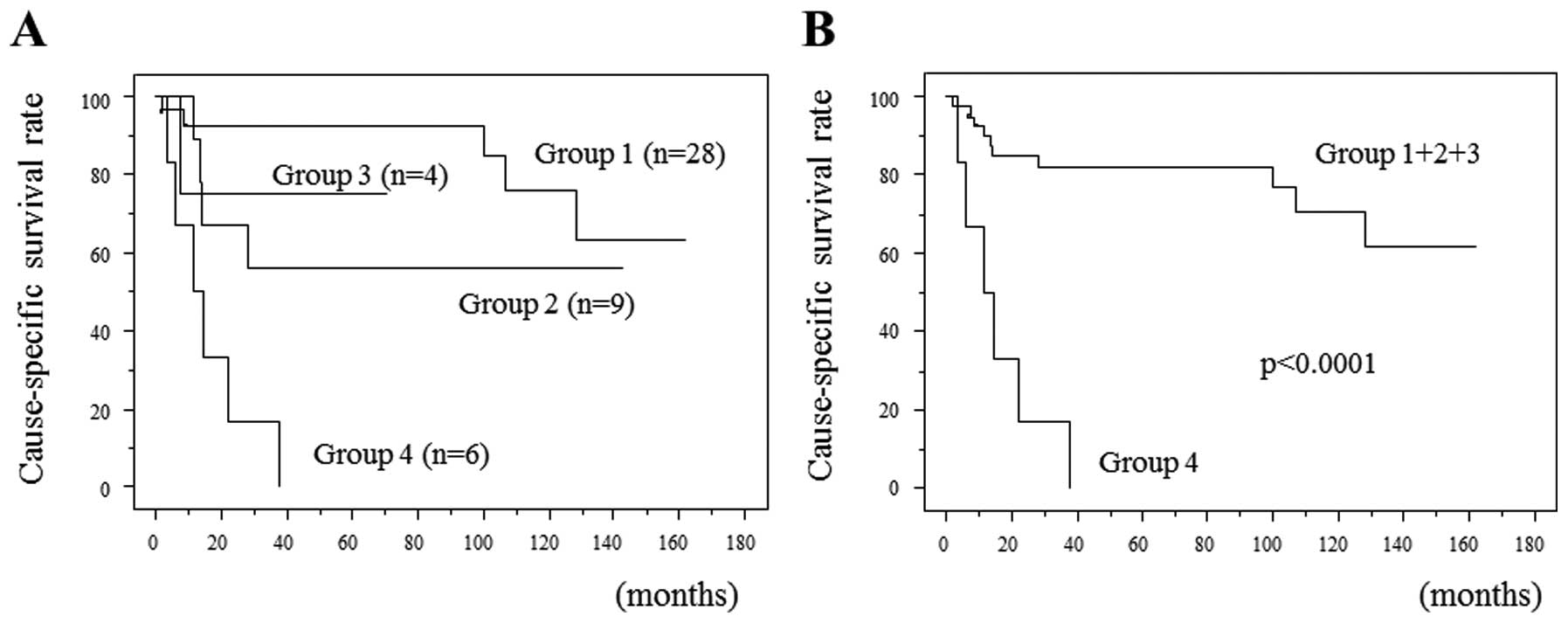|
1.
|
Da Silva JL, Lacombe C, Bruneval P,
Casadevall N, Leporrier M, Camilleri JP, Bariety J, Tambourin P and
Varet B: Tumor cells are the site of erythropoietin synthesis in
human renal cancers associated with polycythemia. Blood.
75:577–582. 1990.PubMed/NCBI
|
|
2.
|
Westenfelder C and Baranowski RL:
Erythropoietin stimulates proliferation of human renal carcinoma
cells. Kidney Int. 58:647–657. 2000. View Article : Google Scholar : PubMed/NCBI
|
|
3.
|
Hardee ME, Arcasoy MO, Blackwell KL,
Kirkpatrick JP and Dewhirst MW: Erythropoietin biology in cancer.
Clin Cancer Res. 12:332–339. 2006. View Article : Google Scholar : PubMed/NCBI
|
|
4.
|
Ljungberg B, Rasmuson T and Grankvist K:
Erythropoietin in renal cell carcinoma: evaluation of its
usefulness as a tumor marker. Eur Urol. 21:160–163. 1992.PubMed/NCBI
|
|
5.
|
Michael A, Politi E, Havranek E,
Corbishley C, Karapanagiotou L, Anderson C, Relph K, Syrigos KN and
Pandha H: Prognostic significance of erythropoietin expression in
human renal cell carcinoma. BJU Int. 100:291–294. 2007. View Article : Google Scholar : PubMed/NCBI
|
|
6.
|
Saintigny P, Besse B, Callard P, Vergnaud
AC, Czernichow S, Colombat M, Girard P, Validire P, Breau JL,
Bernaudin JF and Soria JC: Erythropoietin and erythropoietin
receptor coexpression is associated with poor survival in stage I
non-small cell lung cancer. Clin Cancer Res. 13:4825–4831. 2007.
View Article : Google Scholar : PubMed/NCBI
|
|
7.
|
Acs G, Xu X, Chu C, Acs P and Verma A:
Prognostic significance of erythropoietin expression in human
endometrial carcinoma. Cancer. 100:2376–2386. 2004. View Article : Google Scholar : PubMed/NCBI
|
|
8.
|
Lai SY, Childs EE, Xi S, Coppelli FM,
Gooding WE, Wells A, Ferris RL and Grandis JR:
Erythropoietin-mediated activation of JAK-STAT signaling
contributes to cellular invasion in head and neck squamous cell
carcinoma. Oncogene. 24:4442–4449. 2005. View Article : Google Scholar : PubMed/NCBI
|
|
9.
|
Lester RD, Jo M, Campana WM and Gonias SL:
Erythropoietin promotes MCF-7 breast cancer cell migration by an
ERK/mitogen-activated protein kinase-dependent pathway and is
primarily responsible for the increase in migration observed in
hypoxia. J Biol Chem. 280:39273–39277. 2005. View Article : Google Scholar
|
|
10.
|
Tilbrook PA, Colley SM, McCarthy DJ,
Marais R and Klinken SP: Erythropoietin-stimulated Raf-1 tyrosine
phosphorylation is associated with the tyrosine kinase Lyn in J2E
erythroleukemic cells. Arch Biochem Biophys. 396:128–132. 2001.
View Article : Google Scholar : PubMed/NCBI
|
|
11.
|
Gong K, Zhang N, Zhang Z and Na Y:
Coexpression of erythopoietin and erythopoietin receptor in
sporadic clear cell renal cell carcinoma. Cancer Biol Ther.
5:582–585. 2006. View Article : Google Scholar : PubMed/NCBI
|
|
12.
|
Papworth K, Bergh A, Grankvist K,
Ljungberg B and Rasmuson T: Expression of erythropoietin and its
receptor in human renal cell carcinoma. Tumour Biol. 30:86–92.
2009. View Article : Google Scholar : PubMed/NCBI
|
|
13.
|
Ito K, Yoshii H, Asakuma J, Sato A,
Horiguchi A, Sumitomo M, Hayakawa M and Asano T: Clinical impact of
the presence of the worst nucleolar grade in renal cell carcinoma
specimens. Jpn J Clin Oncol. 39:588–594. 2009. View Article : Google Scholar : PubMed/NCBI
|
|
14.
|
Horiguchi A, Asano T, Asakuma J, Asano T,
Sumitomo M and Hayakawa M: Impact of caveolin-1 expression on
clinicopathological parameters in renal cell carcinoma. J Urol.
172:718–722. 2004. View Article : Google Scholar : PubMed/NCBI
|
|
15.
|
Sturiale A, Campo S, Crascì E, Coppolino
G, Bolignano D, Grasso G and Buemi M: Erythropoietin and its lost
receptor. Nephrol Dial Transplant. 22:1484–1485. 2007. View Article : Google Scholar : PubMed/NCBI
|
|
16.
|
Miyajima A, Kosaka T, Asano T, Asano T,
Seta K, Kawai T and Hayakawa M: Angiotensin II type I antagonist
prevents pulmonary metastasis of murine renal cancer by inhibiting
tumor angiogenesis. Cancer Res. 62:4176–4179. 2002.PubMed/NCBI
|
|
17.
|
Islam AH, Ehara T, Kato H, Hayama M,
Kobayashi S, Igawa Y and Nishizawa O: Calponin h1 expression in
renal tumor vessels: correlations with multiple pathological
factors of renal cell carcinoma. J Urol. 171:1319–1323. 2004.
View Article : Google Scholar : PubMed/NCBI
|
|
18.
|
Ribatti D, Marzullo A, Nico B, Crivellato
E, Ria R and Vacca A: Erythropoietin as an angiogenic factor in
gastric carcinoma. Histopathology. 42:246–250. 2003. View Article : Google Scholar : PubMed/NCBI
|
|
19.
|
Vesey DA, Cheung C, Pat B, Endre Z, Gobé G
and Johnson DW: Erythropoietin protects against ischaemic acute
renal injury. Nephrol Dial Transplant. 19:348–355. 2004. View Article : Google Scholar : PubMed/NCBI
|
|
20.
|
Li J, Vesey DA, Johnson DW and Gobe G:
Erythropoietin reduces cisplatin-induced apoptosis in renal
carcinoma cells via a PKC dependent pathway. Cancer Biol Ther.
6:1944–1950. 2007. View Article : Google Scholar : PubMed/NCBI
|















